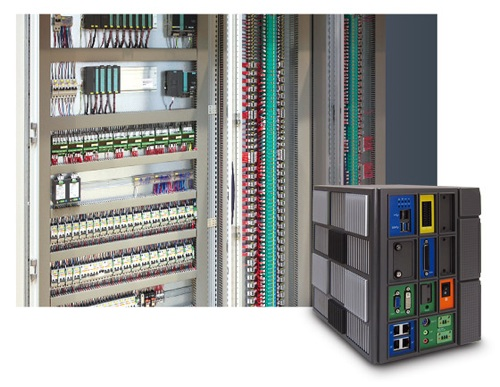 A new whitepaper titled ‘IP-Based Fieldbus Holds the Key to Smart Factory of Industry 4.0’ has been published by Nexcom.
A new whitepaper titled ‘IP-Based Fieldbus Holds the Key to Smart Factory of Industry 4.0’ has been published by Nexcom.
The essence of Industry 4.0 lies in maximising network coverage to streamline production and sales processes, facilitating information sharing and communication between the processes to build a smart factory.
From a practical standpoint, a smart factory can achieve factory automation and remote monitoring, ensuring seamless production. It can assist manufacturers, integrate the various data of production, logistic and inventory management, enabling real time control of capacity planning to meet the real time needs of customised orders. Furthermore, smart factory can increase the production capacity without expanding factories.
In achieving the vision of a smart factory, building an industrial network and implementing PC-based controllers have now become important topics.
“Industrial networks possess various advantages including high scalability, long distance and real time transmission of big data. They can adapt to the addition or removal of devices, and expand or adjust their network structure accordingly to meet the need of real time data transmission across different plants. In addition, industrial networks can be configured in redundant ring topologies to provide reliable data transmission, a critical requirement for smart factories that legacy serial protocols fail to meet,” explained David Lee, director of product management, NEXCOM Industrial Computing Solutions Business Unit.
For example, in the petrochemical industry, a petrochemical plant may cover several dozen hectares of space, requiring operators to gather large amounts of monitoring and control parameters from dozens of facilities throughout the plant. In addition, each facility may be responsible for different upstream and downstream processes. These facilities must communicate with each other in real time without interruption in order to achieve parameter optimisation, enabling operators to perform preventive maintenance and repair, ensure error-free operation and maximise electricity generation.
However, as there is a large number of different Fieldbus protocols from different manufacturers, building an industrial network is not an easy task. Furthermore, a smart factory must be built using the existing devices and system as the basis. Currently, the leading manufacturers in the factory automation market are Siemens, Rockwell and Beckhoff. These manufacturers have a long established reputation with proven reliability and stability. Therefore, the network protocols typically used in industrial networks are manufacturer specific protocols, such as PROFINET, PROFIBUS, EtherNet/IP, DeviceNet and EtherCAT.
Under this circumstance, the benefits of PC-based controllers are more evident. Lee explained, “First, the communication interface supported by PC-based controllers is more broad and flexible compared to Programmable Logic Controllers (PLC). Second, PC-based controllers can scale easily, if more machines and field instruments are added to the production lines and factory floors, PC-based controllers can be installed quickly with simple wiring, and with minimal or even no interruption to the plant operation. For PLCs, this may not be the case.” Lee further added that at 2013 automation trade shows, various industrial control manufacturers were showcasing PC-based control systems, highlighting the significance of PC-based controllers in industrial automation.
Lee pointed out that when converging to an IP-based smart factory, it is vital to adapt to the established protocols of the industrial control market, because industrial control systems in the manufacturing site may use protocols from different vendors.
For example, the process control and wastewater treatment system of a semiconductor manufacturer may include more than one vendor’s solution. In the petrochemical industry, petrochemical plants built at different construction periods may use different industrial control systems. Furthermore, the manufacturing sites of automotive and home appliance plants may include a combination of commercial computers and industrial controllers. To assist manufacturing businesses to overcome these challenges in building an IP-based smart factory, PC-based controllers can ensure smooth production during the transition.
NEXCOM has released the NEXCOM Industrial Fieldbus Embedded Computer (NIFE) solution, which are a range of PC-based controllers. Available in different processor configurations and form factors, the NIFE solution integrates widely used Fieldbus interface cards to support all types of Fieldbus protocols, and comes with full software capabilities, ranging from real time to non-real time operating systems, to motion control software and HMI/SCADA software integration.
In addition, the Fieldbus interface cards, operation systems and software are verified and validated by original equipment manufacturers (OEM). The NIFE solution ensures compatibility among the PC-based controllers, Fieldbus interface cards and software.
Using a comprehensive matrix approach to hardware and software compatibility, NEXCOM has precisely integrated a stable industrial control system that is able to link the communication between the factory and the field, and then share the information to the management and operation levels of the enterprise network. By bridging the communication gaps, NEXCOM’s NIFE solution can help businesses build an IP-based smart factory and fulfill the vision of Smart Production, Green Production and Urban Production in the era of Industry 4.0.

